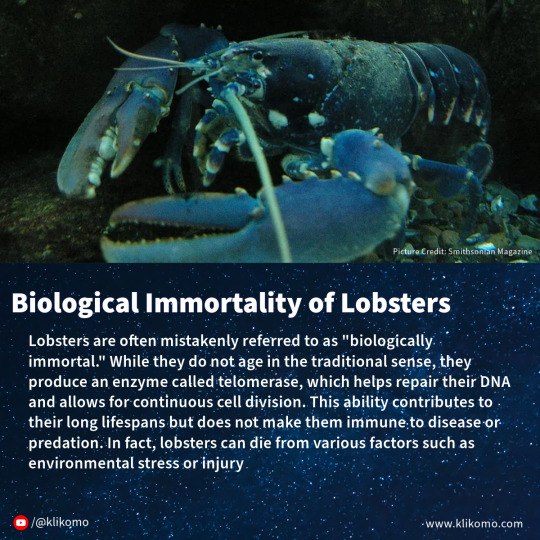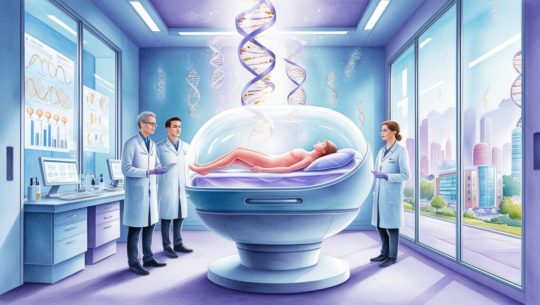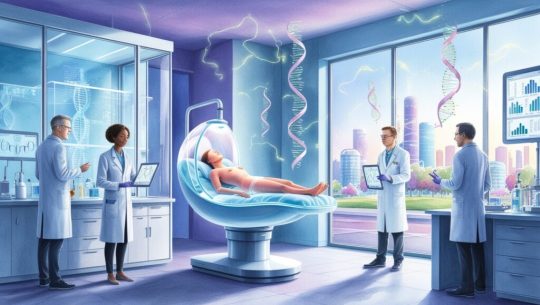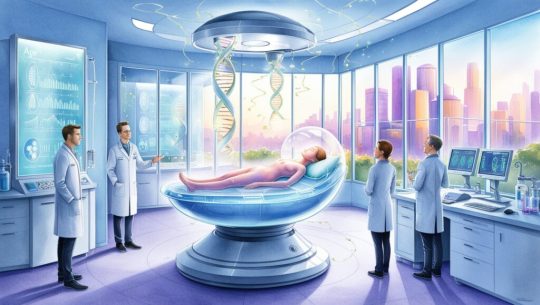#BiologicalImmortality
Explore tagged Tumblr posts
Text

Interesting Facts #3
#LobsterFacts#BiologicalImmortality#MarineBiology#NatureScience#WildlifeConservation#OceanLife#SustainableSeafood#Telomerase#AquaticLife#SeaCreatures#UnderwaterWorld#MarineEcosystem#Biodiversity#ScienceFacts#AnimalBehavior#LobsterLovers#FoodScience#LongevityResearch#EnvironmentalScience#Invertebrates#OceanConservation#ExploreTheOcean#HealthyEating#FoodForThought#InstaScience#NaturePhotography#OceanAwareness
4 notes
·
View notes
Text
What If We Could Live Forever Using Genetic Engineering 2025

What If We Could Live Forever Using Genetic Engineering 2025
The dream of immortality is as old as human civilization itself. From ancient myths about the Fountain of Youth to science fiction tales of digital consciousness, the idea of living forever has fascinated thinkers, scientists, and everyday people alike. But in 2025, we're closer than ever to turning that fantasy into a scientific possibility—through the lens of genetic engineering. What if we could reprogram our biology, fix aging at the molecular level, and extend human life indefinitely? Let’s dive into the science, the speculation, and the staggering implications of this futuristic concept.
The Science of Aging: Can It Be Reversed?
Aging is not just the passage of time—it's a biological process. At its core, aging results from cellular damage, DNA mutations, oxidative stress, telomere shortening, and other factors that gradually degrade our body’s function. But what if we could fix those issues? That’s where genetic engineering comes in. Genetic Tools in 2025 In recent years, powerful tools like CRISPR-Cas9, base editing, and epigenetic reprogramming have revolutionized genetic science. These technologies allow scientists to: - Edit faulty genes - Remove mutations - Reset epigenetic markers associated with aging - Regrow tissues and organs from stem cells Researchers are already experimenting with genes like FOXO3, SIRT1, and TP53—genes known to influence longevity. In mice and worms, tweaking these genes has extended lifespan by up to 50%. While we're still in the early stages with humans, the potential is enormous.




Pathways to Immortality Through Genetic Engineering
If we assume continued breakthroughs in biotech, here are several pathways that might lead us to biological immortality: 1. Telomere Extension Telomeres are protective caps on the ends of our chromosomes that shorten each time a cell divides. Once they become too short, the cell stops functioning properly. Genetic therapies could reactivate the enzyme telomerase, which rebuilds telomeres and slows aging. Example: In 2024, researchers at a major biotech firm used telomerase activation in mice to extend their healthy lifespan by 30% without increasing cancer risk. 2. Senescent Cell Removal As we age, our bodies accumulate senescent cells—cells that no longer divide but don’t die. These cells secrete harmful chemicals that damage nearby tissue. Genetic engineering might allow us to target and eliminate these cells, reducing inflammation and restoring tissue function. 3. DNA Repair Enhancement One of the biggest causes of aging is the accumulation of DNA damage. Using gene editing, scientists could enhance natural DNA repair mechanisms, making cells more resilient and less prone to mutation. 4. Epigenetic Reprogramming This technique involves resetting a cell's “biological clock” by modifying gene expression, not the DNA itself. Some scientists believe we can return cells to a more youthful state, effectively reversing aspects of aging.
Ethical and Social Implications
Living forever might sound incredible, but it comes with massive ethical baggage. Here are some questions we’d have to grapple with: - Who gets access to life-extending treatments? Just the wealthy? - What happens to population growth, resource distribution, and employment? - Would immortality change our sense of purpose, risk, and identity? - Could living forever dull the meaning of life? There’s also the risk of unintended consequences. What if reactivating certain genes to extend life also increases the risk of cancer? Or creates unforeseen changes in behavior or cognition?
Could This Actually Happen?
In 2025, we're not immortal yet. However, longevity research is booming, and life-extension breakthroughs are happening faster than many anticipated. Companies like Calico (Google’s longevity arm), Altos Labs, and numerous university labs are pushing boundaries in age reversal. Clinical trials involving gene therapies for specific aging-related diseases—like macular degeneration, Alzheimer’s, and cardiovascular disease—are already underway. Experts believe that within the next 10 to 20 years, we might not achieve full immortality, but we could dramatically extend the human lifespan and quality of life.
A Future Without Death?
If genetic engineering could one day eliminate aging and disease, we might see an entirely new kind of human society: - People living for centuries - Shifting family and social structures - Long-term careers and infinite learning - New philosophical questions about existence But we’d also face major challenges: environmental strain, overpopulation, and existential boredom. It’s one thing to imagine a world without death—living in it would be something entirely different.
Conclusion
The idea of living forever using genetic engineering may seem like science fiction, but in 2025, it’s becoming more of a scientific possibility than ever before. By manipulating the very code of life, we might one day control aging, conquer disease, and rewrite what it means to be human. But with this power comes the responsibility to consider the moral, social, and ecological impact of eternal life. We must ask: just because we can live forever—should we? — For a deeper look into genetic engineering and aging, check out: https://en.wikipedia.org/wiki/Gene_therapy — 🧬 Explore more of our speculative science blogs: What If Human Consciousness Could Be Uploaded Into Light 2025 https://edgythoughts.com/what-if-human-consciousness-could-be-uploaded-into-light-2025 What If Dreams Could Be Recorded and Played Back 2025 https://edgythoughts.com/what-if-dreams-could-be-recorded-and-played-back-2025 Read the full article
#1#10#2#20#2024-01-01t00:00:00.000+00:00#2025-01-01t00:00:00.000+00:00#2025https://edgythoughts.com/what-if-dreams-could-be-recorded-and-played-back-2025#2025https://edgythoughts.com/what-if-human-consciousness-could-be-uploaded-into-light-2025#3#30#4#50#ageing#altoslabs#alzheimer'sdisease#baggage#behavior#biologicalimmortality#biologicalprocess#biology#biotechnology#blog#boredom#calico(company)#cancer#cardiovasculardisease#cell(biology)#cellularsenescence#chemicalsubstance#chromosome
0 notes
Text
Patrick Ludlow Carol Williams And Digital Immortality

0 notes
Text
Biological Immortality! Can Humans Live Forever?

Upon till this point, mankind's only option on attaining immortality was by relying on old biblical and theoretical eschatological promises concerning our soul and its supposed eternal perpetuation. However, for the first time since our inception humanity may be on the precipice of taking the promise of everlasting existence into our own hands. Enter biological immortality. Biological Immortality is defined as a stable or decreasing rate of mortality of a living organism from cellular senescence. If you read between the lines an organism may still die, just not from any age induced diseases. So how is this related to humans?
Senescence & DNA Degradation
Well first, let's examine senescence (the process deteriorating due to age). As you age, your cells replicate a countless amount of times. And in each of the estimated 30 to 40 trillion cells that makes up the average person, lies your DNA.We are all somewhat familiar with DNA correct? DNA is to living organisms what a computer program is to a software. It dictates all that we are, from the complex metabolic process that occur in our bodies to mundane traits such as how tall we are and the color of our hair, DNA is the structural blueprint that makes up an organism. During mitosis, the process of cellular reproduction, DNA has to be meticulously copied for the nucleus of the daughter cell. As you can imagine, after the countless billions if not trillions of times of going through this process, errors occur in the process and the DNA code is damaged. This is believed to be the reason we age. There lies a direct correlation with aging and pathologies such as cancer and certain neurodegenerative disorders. So it would make sense that if we can prevent the process of aging all together, these diseases can be circumvented. But how would this be made possible?
Biological Immortality
It's not as if biological immortality is some never before seen phenomenon, there are more than one species that we would consider biological immortal, some have been hiding right under you nose on your dinner plate! Lobsters! Yes, Lobsters do not undergo senescence. There has been recent debates on rather lobsters are biologically immortal or not, but the fact is they do not undergo senescence. At least not in the traditional sense. Lobsters grow by molting, and there is a set limit on the amount of times they may go through the process. Each molt requires more energy than the last until they reach a point where the energy expenditure required to molt is too great and they die. However, as time progresses, lobsters do not deteriorate due to the passage of time. So in essence lobsters are biologically immortal! The phenomenon of biological immortality is not just limited to lobsters either. The Greenland sharks are the longest living vertebrates, estimated to live for up to 400 years. Aldabra giant turtles lives to be 150 years old, with the oldest one said to have been around 250 years old. Rougheye rockfish live to be as old as 205 years old. These are just a few of the many different vertebrates that exhibit negligible senescence (biological immortality). Biological Immortality & Humans The key to unlocking biological immortality in humans lies within these many animals. By studying their genome, we can discover the mechanisms which enables these animals to have these great lifespans and compound upon this knowledge. And great strides are being made from these studies. Make no mistake this is a controversial topic. Due to deep cultural feelings and beliefs systems, the concept of altering the make up of a human being to make them better remains somewhat in the realm of what's taboo. Nevertheless, research into a viable way of achieving biological immortality in humans are currently underway throughout the world and leading the way is Bioviva USA Inc., who's CEO Elizabeth Parrish has already undergone gene therapy to reverse her biological age. Also, there is the SENS Research Foundation, who currently are researching plausible pathways in which humans can achieve biological immortality.
Looking Forward
Contrary to its name, biological immortality is not true immortality. As mentioned before, any animal that is biologically immortal is still susceptible to death from injury or disease. However, immortality is still within reach. Negligible senescence is just the first part of that process and with future advancements in nano-medicine eventually even dying from disease will become a thing of the past. And while the threat of injury still remains eventually we will find a way to overcome even this. It's what we do. We humans. Read the full article
0 notes
Text
Patrick Ludlow Carol Williams And Biological Immortality

#PatrickLudlowCarolWilliams#BiologicalImmortality#NegligibleSenescence#IndefiniteLifespan#Patrickanthropyist
0 notes